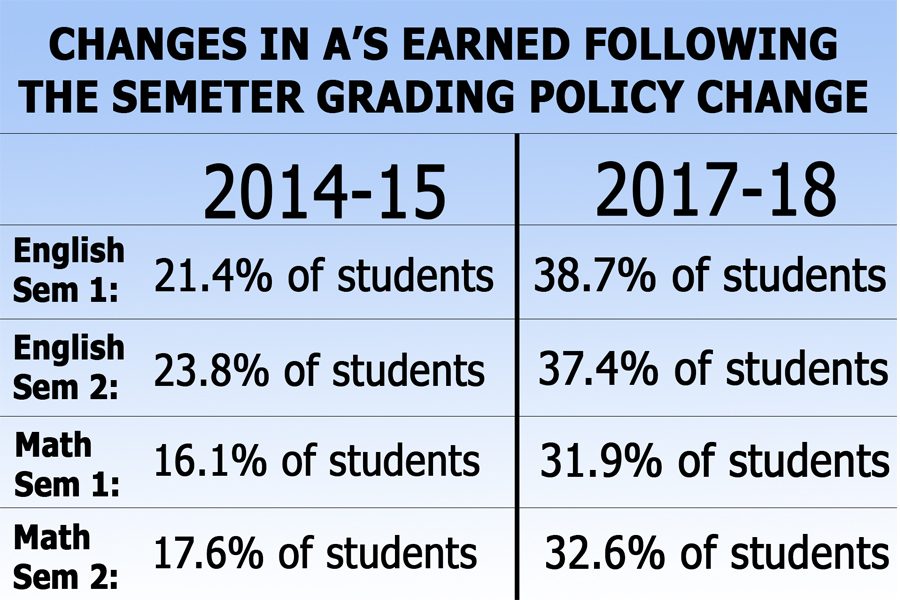MCPS Needs to Address Grade Inflation Head On
February 15, 2019
Many publications including the Washington Post have been discussing MCPS, and while the school system is usually spoken of highly and commended for its work, this time, potential grade inflation is the primary topic, presenting MCPS and its new grading policy in an unflattering light.
The Washington Post released an article Dec. 31 highlighting MCPS’ lenient grading policy and suggested that it is causing grade inflation, the awarding of undeserved higher grades. In response, Superintendent Jack R. Smith has asked the community to give the Board of Education (BOE) more time to review the policy and the potential issue it poses. Instead of handling the situation passively and quietly, MCPS should handle these revelations with more urgency and use community feedback to make a decision on whether or not grade inflation is occurring and whether or not to alter the grading policy.
At the beginning of the 2016-17 school year, MCPS switched the grading policy so that students earning an A in one quarter and a B in the other would receive an A for their semester grade. Previously, students had to earn an A both quarters or a B in the first quarter and an A in the second, signaling improvement, in order to receive an A for their semester grade.
Under the current policy, the number of A’s earned has skyrocketed. During the first semester of the 2014-15 school year, 16.1 percent of all MCPS students earned an A in a math class. During the first semester of the 2017-18 school year, 31.9 percent of students earned an A in the same classes — nearly double the amount of A’s were earned. Similar increases have occured in English classes. During the first semester of the 2014-15 school year, 21.4 percent of students earned an A in an English class. During the first semester of the 2017-18 school year, 38.7 percent of students earned an A in the same classes, a 17.3 percent increase, according to a Aug. 8 memorandum from Smith.
Many teachers were against the change in grading policy as students would be able to use the system to their advantage and only have to work hard half of the time, but nevertheless, Smith and the BOE changed the policy.
Smith should listen to what teachers, students and parents have to say because they are the most involved in the actual process and are directly affected by the changes made. Grade inflation is a serious issue and is likely occurring as the number of A’s earned continues to rise while external test scores do not show the same improvement. In 2014, the average SAT score earned by MCPS students was a 1650 on the 2400 scale, which translates to an 1190 on the 1600 scale. In 2018, the average score earned was an 1167 on the 1600 scale, a 23-point decrease, according to reports by the MCPS Office of Shared Accountability.
Smith has asked for more time to review the data, but students, the ones who are directly affected by grade inflation, cannot afford to wait. High school, where grades have the most impact on students’ futures, is only four years long and about half of the students currently in high school have less than two years left. The students currently affected shouldn’t be hung out to dry — a policy change, or proof of no grade inflation, is needed immediately.
The county praises itself for making students college and career ready, but grade inflation contradicts that as it harms students’ futures. Students affected by grade inflation are plagued with a false sense of success as they are applauded for an average work ethic. Students will be faced with a rude awakening when they go off to college and join the workforce and are not earning top grades or praise for mediocre work. They will not be used to having to put forth consistent and constant effort because when they attended an MCPS school, they were able to get away with trying hard just half of the time. This puts students at risk for failing college classes or losing jobs.
While it would be great to believe students continue to push themselves even when they know they have already secured an A, it would be naive to do so. MCPS earned an 11.7 out of a possible 20 points in the academic achievement section of the Maryland state accountability report card that measures the success of schools, released by the Maryland State Department of Education (MSDE) Dec. 4. Clearly, MCPS students are not doing as well as hoped as they earned a mere 50 percent of available points.
MCPS needs to refocus their energy on the students within the county instead of its reputation from an outsider’s perspective.





